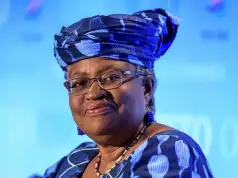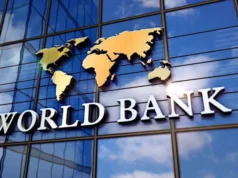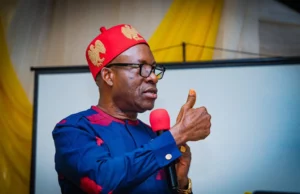The World Bank has approved three new loan requests totalling $1.57bn in financing for Nigeria.
According to a statement released on Monday, the approval is to support the Federal Government in strengthening human capital through better health for women, children, and adolescents.
It added that the approved projects would also help build resilience to the effects of climate change, such as floods and drought, through improving dam safety and irrigation.
READ ALSO: China Ready To Lend Us More Money, We’re Not Discussing Debt Forgiveness With Them — FG
The statement read, “The World Bank has today approved three operations for a total of $1.57bn to support the Government of Nigeria in strengthening human capital through better health for women, children, and adolescents and building resilience to the effects of climate change such as floods and droughts through improving dam safety and irrigation.”
The international lender stated that this new financing includes $500m for addressing governance issues that constrain the delivery of education and health, $570m for the Primary Healthcare Provision Strengthening Programme, and $500m for the Sustainable Power and Irrigation for Nigeria Project.
“The HOPE-GOV and HOPE-PHC programs combined will support the Government of Nigeria to improve service delivery in the basic education and primary healthcare sectors, which are critical towards improving Nigeria’s human capital outcomes.
“The SPIN project will support improvement of dams’ safety and management of water resources for hydropower and irrigation in selected areas of Nigeria.
“The HOPE-GOV Programme will support Nigeria to address underlying governance weaknesses in the systems and procedures of government in two key human development sectors,” it noted.
The approval, made on September 26, 2024, highlights the World Bank’s commitment to strengthening Nigeria’s human capital and building resilience in the face of climate threats.
It also indicates that Nigeria has secured a total of $6.52bn in loans from the World Bank under the administration of President Bola Tinubu amid concerns over the country’s rising external debt servicing costs.
Continuing, the World Bank explained that the HOPE-GOV Program will address underlying governance weaknesses in the systems and procedures of government to substantially reduce maternal and under-five mortality, benefiting 40 million people, especially vulnerable populations.
It said the project to be implemented by the Federal Ministry of Budget and Economic Planning, the Federal Ministry of Budget and Economic Planning, the Federal Ministry of Health and Social Welfare, and the Federal Ministry of Education will receive $500 million in International Development Association credit and an additional $70 million in grant financing from the Global Financing Facility for Women, Children, and Adolescents.
“The HOPE-GOV Program will support Nigeria to address underlying governance weaknesses in the systems and procedures of government in two key human development sectors. It will particularly focus on critical cross-cutting challenges and enabling factors related to both financial and human resource management in basic education and primary healthcare sectors. The program will increase the availability and effectiveness of financing for basic education and primary healthcare service delivery, enhance transparency and accountability of financing, and improve recruitment, deployment, and performance management of basic education teachers and primary healthcare workers by federal, state, and local governments.
“In support of the government’s newly launched reforms in the health sector, under the Health Sector Renewal Investment Initiative, the HOPE-PHC project will improve the quality and utilization of core reproductive, maternal, newborn, child, and adolescent health and nutrition services to substantially reduce maternal and under-five mortality and to improve the resilience of the health system—benefiting 40 million people, especially vulnerable populations.
“The project is financed by a concessional $500 million International Development Association credit and an additional $70 million in grant financing from the Global Financing Facility for Women, Children, and Adolescents. The GFF support includes $11 million from the UK Foreign, Commonwealth & Development Office and $12.5 million from the Children’s Investment Foundation Fund through joint financing with the GFF to help close the financing gap for primary and community healthcare and maternal newborn care at hospital-level, while also supporting government efforts to ensure sustainable financing for family planning commodities,” the statement explained.
Also, the Bretton Woods Institution affirmed that the SPIN project will further support the provision of new and improved irrigation and drainage services over an area of 40,000 hectares, benefiting up to 950,000 people, including households, farmers, and livestock breeders.
It will be supervised and implemented by the Federal Ministry of Water Resources and Sanitation.
“The SPIN Program will help Nigeria to protect citizens from floods and drought through enhanced dam safety and operations. The project will further support the provision of new and improved irrigation and drainage services over an area of 40,000 hectares.
“This will help up to 950,000 people, including households, farmers, and livestock breeders, to directly benefit from more reliable, climate-resilient, and efficient irrigation, water supply and increased agricultural productivity through improved irrigation water management. Through the SPIN project, the government will develop a master plan for hydropower and a structured public-private partnership transaction for a hydropower project.”
Commenting, the World Bank Country Director for Nigeria, Dr Ndiamé Diop, stated that the approval underscores the Bank’s commitment to addressing the complex challenges faced by Nigerians, particularly women and girls, in accessing quality services and improving governance structures that contribute to these issues.
“Effective investment in the health and education of Nigerians today is central to increasing their future employment opportunities, productivity, and earnings while reducing poverty among the most vulnerable. This new financing for human capital and primary healthcare will help to address the complex difficulties faced by Nigerians, especially women and girls, around access and quality of services, but also the governance arrangements that explain these difficulties.
“The SPIN program is timely and will protect Nigerians from floods and droughts in the areas where it will be implemented while enabling an increase in hydropower generation. The direct positive impact of this project on people and livelihoods is enormous. The World Bank is pleased to work with the government and other stakeholders to deliver this program,” he added.
The World Bank is expected to approve another loan request worth $500 million by December 16, 2024, for the Rural Access and Agricultural Marketing Project—Scale Up project.
Recall that on June 13, the World Bank announced the approval of two loan projects aimed at bolstering Nigeria’s economic stability and supporting its vulnerable populations.
According to a statement from the bank, the combined package, totalling $2.25bn, comprises the $1.5bn Nigeria Reforms for Economic Stabilization to Enable Transformation Development Policy Financing Program and the $750m Nigeria Accelerating Resource Mobilization Reforms Program for Results.
Already, the international lender has received $751.88m of the $1.5bn under the Nigeria Reforms for Economic Stabilisation to Enable Transformation.
Not less than six loan projects have been approved, and they include loans for power ($750m), women empowerment ($500m), girl’s education ($700m), renewable energy ($750m), economic stabilization reforms ($1.5bn) and resource mobilization reforms ($750m).
Data from the external debt stock report of the Debt Management Office shows that Nigeria owes the World Bank a total of $15.59 billion as of March 31, 2024.










